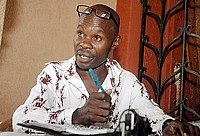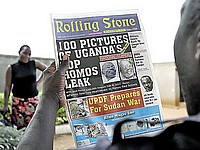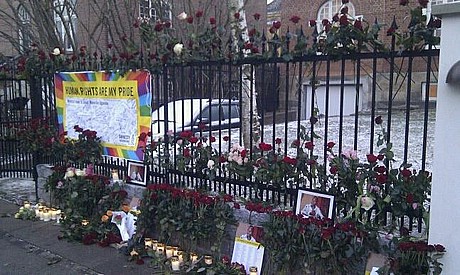Uganda: Mord an LGBT-Aktivist David Kato – Untersuchung gefordert
 David Cato, getöteter Aktivist (© Sexual Minorities Uganda)
David Cato, getöteter Aktivist (© Sexual Minorities Uganda)
David Kato, Mitarbeiter für Öffentlichkeitsarbeit (advocacy officer) der Organisation für Sexuelle Minderheiten in Uganda wurde am Mittwoch (26. Janaur 2011) in seinem Haus im Distrukt Mukono ausserhalb von Kampala von Unbekannten am Kopf schwer verletzt. Er verstarb noch auf dem Weg ins Spital.
Amnesty News (27.1.2011): Uganda must investigate killing of LGBT rights activist (Englisch)
Begräbnis gestört, Die Standard, 28.1.2011: Eklat bei Beerdigung von Homosexuellen-Aktivist (Dt)
HRW, 31.1.2011: Funeral of LGBT Activist Marred by Homophobia (Englisch, Audio)
Täter vorgeführt, 4.2.2011, rfi: Un homme avoue le meurtre de David Kato (Französisch)
Europa:
von Amnesty: recommendations to the European Union on improving the human rights sitation for LGBTI people and human rights defenders working on LGBT-issues in Uganda (Englisch)
Auch Jerzy Buzek, Präsident des Europaparlaments, verlangt eine Aufklärung (Englisch)
NZZ, 27.1.2011: Homosexueller Aktivist in Uganda ermordet. Es soll sich eher „nur“ um Raubmord gehandelt haben – Täter fühlen sich sicher vor Verfolgung, wenn sie „nur“ Homosexuelle ermorden.
Andrea Böhm in der Zeit, 27.1.2011: Nachruf auf einen Furchtlosen: zum Mord an David Kato.
Zur Hetzjagd auf Homosexuelle in Uganda:
Schwulenaktivist Frank Mugisha muss mehr denn je um sein Leben fürchten (Nov 2010)
 Bild gross Zeitungsleser des Rolling Stone in Kampala mit den Bildern der 100 „Top-Homos“ (© cristianosgays.com).
Bild gross Zeitungsleser des Rolling Stone in Kampala mit den Bildern der 100 „Top-Homos“ (© cristianosgays.com).
Uganda, Film: The Kuchus of Uganda (Mai 2010)
Uganda, Aktion: Urgent Action gegen neues Diskriminierungsgesetz (Jan. 2010)
Uganda, Fluchtbericht: «Du darfst nicht lieben, wen du willst» (Jan. 2010)
Uganda, Hintergrund: Gesetzesentwurf droht Schwulen mit der Todesstrafe (Okt. 2009)
< ! ----------------------------------------------------------------------------------->
Mehr
< ! -----------------------------------------------------------------------------------> Uganda must investigate killing of LGBT rights activist – 27 January 2011
David Kato campaigned for an end discrimination against LGBT people in Uganda (©: Sexual Minorities Uganda).
Amnesty International has called on the Ugandan authorities to ensure a credible investigation into the death of a Lesbian, Gay, Bisexual and Transgender (LGBT) rights activist who successfully sued a national newspaper which named him as being homosexual.
David Kato, the advocacy officer for the organization Sexual Minorities Uganda, died on his way to hospital on Wednesday afternoon, after he was hit on the head by an unknown attacker at his home in the Mukono district, outside Kampala.
„Amnesty International is appalled by the shocking murder of David Kato. The Ugandan government must immediately ensure a credible and impartial investigation into his murder,“ said Michelle Kagari, Amnesty International’s Deputy Director for Africa.
„It is deeply worrying that the Ugandan government has been so conspicuously silent about discriminatory rhetoric against LGBT people in Uganda. Now more than ever is the time for the authorities to reassure Ugandans that it will protect them against threats and violence regardless of their real or perceived sexual orientation or gender identity.
„Any persons suspected of involvement in the murder must be brought to justice in a fair trial which complies with international standards.“
Kato had been calling for the authorities to take action to end discrimination against LGBT people in Uganda, particularly in tabloid newspapers which have been publishing the names, pictures and personal details of people they believe to be LGBT.
On 2 October 2010, Rolling Stone, a weekly tabloid paper launched last year by university graduates, published what it labelled „100 Pictures Of Uganda’s Top Homos“. Another article had the headline „hang them“ above a list of names and photos.
On 3 January a High Court judge ruled against the Rolling Stone in a case filed against the tabloid by Kato and two other activists.
Judge Vincent Musoke-Kibuuke banned the tabloid from revealing the identities of LGBT people and extended the ruling to all Ugandan media.
The Court ruled that “the exposure of the identities of the persons and homes of the applicants for the purposes of fighting gayism and the activities of gays…threaten the rights of the applicants to privacy of the person and their homes”.
The two other activists with whom Kato filed the case have also reported incidents of threats to their lives.
In recent years human rights organizations including Amnesty International have documented the steady increase in discrimination, arbitrary arrests, incommunicado detention, torture and other ill-treatment on the basis of sexual orientation and gender identity in Uganda, and against activists exposing violations against LGBT people.
Sexual Minorities Uganda along with a number of other civil society organizations has been at the forefront of advocating against the Anti-Homosexuality Bill published on 25 September 2009.
If it becomes law The Bill would violate international human rights law and lead to further human rights violations.
Quelle: Amnesty News (Englisch).
Nachruf auf einen Furchtlosen: zum Mord an David Kato – Von Andrea Böhm, 27. Januar 2011

© Böhms Logbuch – Von Kabul bis KinshasaWahrscheinlich ist es vermessen, zu sagen, David Kato habe keine Angst gehabt. In den vergangenen Monaten fühlte er sich nicht mehr sicher, das hat er Freunden gesagt. Vielleicht fühlte er sich Zeit seines Lebens nicht sicher als schwuler Mann in Uganda.
Kato, einer der prominentesten Bürgerrechtler Ugandas, wurde in den frühen Morgenstunden des 26. Januar von einem Eindringling durch Hammerschläge auf den Kopf so schwer verletzt, dass er auf dem Weg ins Krankenhaus starb. Ein Tatverdächtiger soll inzwischen verhaftet worden sein. Das klingt nach einem Einbruch, doch Katos Lebensgeschichte legt den Verdacht nahe, dass dies ein hate crime war. Ein Mord aus Hass gegen Homosexuelle.
“Hängt sie auf!” Mit dieser Schlagzeile überschrieb die ugandische Boulevardzeitung “Rolling Stone” (die nichts, aber auch gar nichts mit dem gleichnamigen Magazin in den USA zu tun hat) vor wenigen Monaten die Fotos mehrerer Männer und Frauen aus der lesbisch-schwulen Community, die mit ihren Namen und Wohnadressen abgedruckt wurden. Es war der vorläufige Höhepunkt einer Hetzjagd gegen Homosexuelle, die von Kirchen, Politikern und Medien angetrieben wird. Homosexualität ist in Uganda wie in vielen anderen afrikanischen Ländern mit drakonischen Haftstrafen belegt. Im Oktober 2009 löste eine Gesetzesvorlage, welche die Todesstrafe für homosexuelle “Wiederholungstäter” vorsieht, einen internationalen Sturm der Empörung aus. Prominenteste Stimme des Protests in Uganda war David Kato.
Der ehemalige Grundschullehrer hatte sein politisches Coming-Out Ende der 90er, nachdem er sich während eines Aufenthalts in Südafrika dort in der lesbisch-schwulen Community engagiert hatte. Südafrika weist, was den Kampf gegen Diskriminierung von Homosexuellen betrifft, eine sehr fortschrittliche Gesetzgebung vor. Gleichzeitig ist gewalttätige Homophobie weit verbreitet. Von der Courage und dem Organisationsgrad der Lesben und Schwulen in Südafrika war Kato so beeindruckt, dass er in Uganda zu einem Vorkämpfer der Homosexuellen – und damit zur Zielscheibe der Schwulenhasser. Wobei in Uganda die evangelikalen Kirchen (mit tatkräftiger Unterstützung ihrer amerikanischen Glaubensgenossen) zu den schlimmsten Antreibern gehören.
Kato musste aufgrund von Drohungen seinen Job als Lehrer aufgeben und widmete sich von da an ganz seiner Arbeit bei der Organisation “Sexual Minorities Uganda” (SMUG). Nachdem Rolling Stone Ende vergangenen Jahres die infame Foto-Kampagne gestartet hatte, wurden mehrere AktivistInnen auf offener Straße angegriffen, eine lesbische Bürgerrechtlerin fast gesteinigt. Kato, dessen Bild auf Titelseite abgedruckt worden war, erhielt Todesdrohungen.
Er tauchte nicht etwa ab, sondern zog vor Gericht, ein scheinbar aussichtsloses Unterfangen. Doch am 3. Januar entschied der zuständige Richter, dass Rolling Stone die Grundrechte Katos und der anderen Betroffenen verletzt habe und ordnete Schadensersatz an. Vor dem Gericht warteten wie an fast allen Verhandlungstagen Demonstranten, die Kato verhöhnten und beleidigten. Es war ein bitter erkämpfter Sieg. David Kato hatte kaum mehr Zeit, ihn zu feiern.
Quelle: Nachruf auf einen Furchtlosen. von Andrea Böhm in der Zeit, 27.1.2011.
Aktion von Amnesty International Dänemark 28.Jan.2011. © Amnesty.


